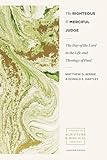These days it is out of fashion to talk about judging and judgment. Ours is a much more “tolerant” age—or so we’re told. But as biblical scholars Matthew Aernie and Donald Hartley point out in The Righteous and Merciful Judge, the idea of God coming in judgment to right all wrongs and settle all scores is at the heart of Scripture.
The ancient heresy of Marcionism still haunts the church, especially when we divide Scripture into two parts and imagine that the first is dominated by justice and wrath, while the second emphasizes mercy and grace. As Aernie and Hartley make clear, such mischaracterizations undermine the unity of Scripture and subvert the true story of God in the world. Some of the most wonderful passages of forgiveness, restoration, and grace are found in the Old Testament; some of the most unsettling about justice, wrath, and judgment are found in the New.
The Righteous and Merciful Judge considers the theme of “the day of the Lord” in Paul’s letters. While Aernie and Hartley stop short of placing this theme at the center of Paul’s theology, they argue that “every aspect of [it] was in some way affected by the concept.” Their book sheds light on an ignored and marginalized feature of Paul’s thought.
Aernie and Hartley pursue their task chronologically, asking first: Where did this concept come from? Scholars can’t pinpoint how and where the notion of “the day of the Lord” entered into Jewish consciousness. Some think it came from Israel’s holy-war tradition, others from enthronement ceremonies when YHWH was installed as King. Some think it came from within Israel itself; others imagine it was adopted and adapted from the Canaanites or the Babylonians.
The starting point remains elusive. What is clear, however, is that the Old Testament throbs with certainty that God will visit the nations, including Israel, in judgment, power, and restoration.
While the phrase “the day of the Lord” doesn’t appear in the books of Moses, the authors demonstrate how the underlying theme sits just beneath the surface in passages that portray God visiting his people through blessings and curses. Only later, among the Old Testament prophets, did the phrase evolve into a technical term denoting the day of final judgment.
Before the coming of Christ, periods of famine, scarcity, war, and ultimately exile could be construed as preliminary “days” of judgment that foreshadowed the final judgment to come. When that day comes, God will make the world right. In the final verdict of history, anything wrong in Israel or the nations must be judged. All that is right is destined to be redeemed and restored. These patterns are found throughout the Old Testament, but they are also present in later Jewish writings such as the Pseudepigrapha and the Dead Sea Scrolls. This was the symbolic world that Paul inherited.
One of the more interesting features of the book is how Aernie and Hartley interpret Paul’s Damascus Road conversion as “a proleptic day of the Lord.” In other words, Paul experienced his own day of judgment when he encountered the risen Christ. Instead of getting what he deserved—God’s wrath—he found mercy. Instead of being marked out for destruction, he was transformed and sent on a new mission. In this encounter, a vicious persecutor exchanged the false identity of Jesus he had developed for the true identity as Messiah, Son of God, and Lord. Afterward, he began to think that the final judgment for all was closer than he ever imagined.
The last portion of the book looks closely at how “the day of the Lord” worked its way into Paul’s epistles. For Paul, “the day of the Lord” would become “the day of our Lord Jesus Christ” (1 Cor. 1:8) or, more simply, “the day of Christ” (Phil. 1:10). Words like coming, revelation, and appearing season his writings, as he likens the coming of Jesus to judge the living and dead to various manifestations of God in the Scripture.
The Righteous and Merciful Judge offers an important corrective for the academy and the church. The current Western mood is to avoid anything that smacks of judgment. We want a merciful, forgiving, anything-goes kind of god, not one who demands something of us and will ultimately judge us. We cannot adequately deal with Paul’s life, mission, and theology without grasping his conviction that history was headed toward a particular destination. The next thing we await is the final, definitive coming of Christ in glory, power, and judgment.
David Capes is dean of the School of Biblical and Theological Studies and professor of New Testament at Wheaton College.
Do you agree? Is this missing something? Share your feedback here.











